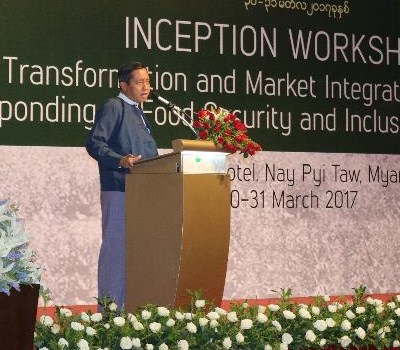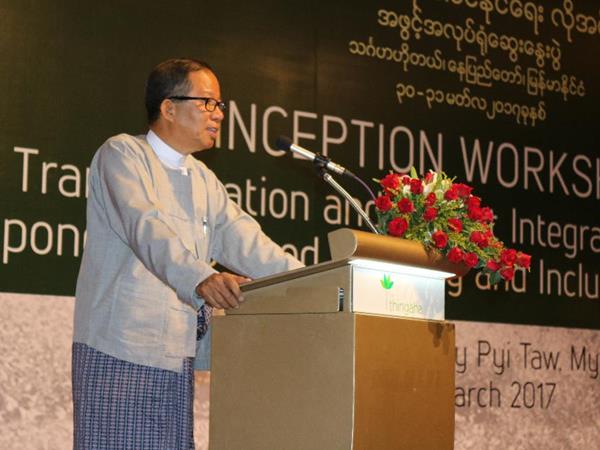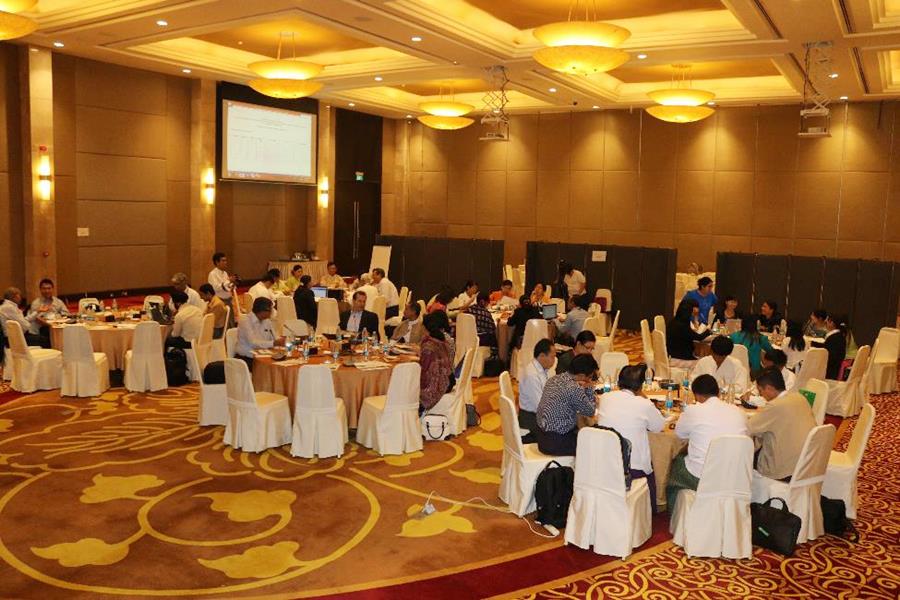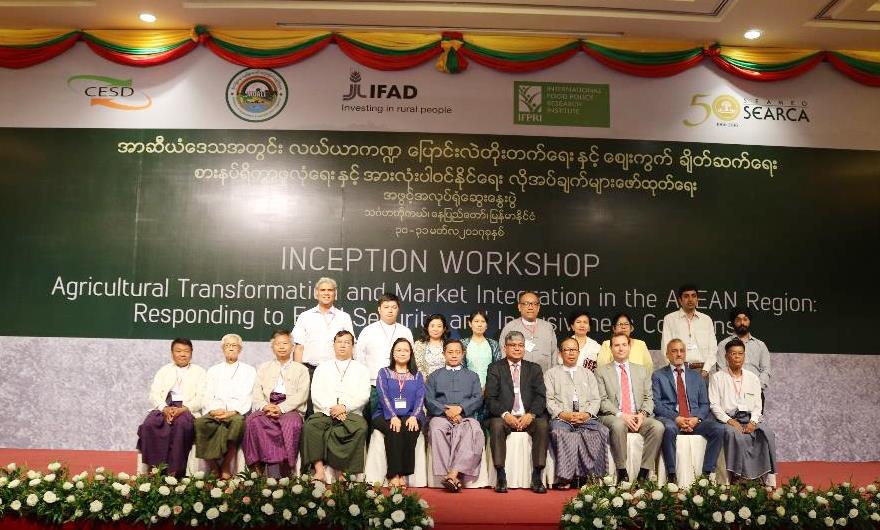 The event opened with the inaugural address of Dr. Tin Htut, Permanent Secretary of MoALI, who highlighted the relevance of the project. He stated that agricultural transformation and market integration are essential to Myanmar. The country's agriculture sector aims for productivity and profitability through strong partnerships—goals which the ATMI-ASEAN support. MoALI is the key institution responsible for food productivity and poverty reduction, and works in partnership with various international development organizations to meet its mandate. It aims for sustainable food security amidst numerous challenges like in the agriculture and livestock sectors, which are greatly affected by the vagaries of nature. Thus, one of the current partnerships of MoALI with its international development partners is the crafting of Myanmar's agriculture sector strategy.
The event opened with the inaugural address of Dr. Tin Htut, Permanent Secretary of MoALI, who highlighted the relevance of the project. He stated that agricultural transformation and market integration are essential to Myanmar. The country's agriculture sector aims for productivity and profitability through strong partnerships—goals which the ATMI-ASEAN support. MoALI is the key institution responsible for food productivity and poverty reduction, and works in partnership with various international development organizations to meet its mandate. It aims for sustainable food security amidst numerous challenges like in the agriculture and livestock sectors, which are greatly affected by the vagaries of nature. Thus, one of the current partnerships of MoALI with its international development partners is the crafting of Myanmar's agriculture sector strategy.
Dr. Fabrizio Bresciani, IFAD Asia and the Pacific Lead Regional Economist, explained that the core mandate of IFAD is improving the livelihoods and achieving better standards of living for those in smallholder agriculture. He notes that statistics for the last 10 years provide cause for optimism: rural wages in many Southeast Asian countries have been rising rapidly. There are more opportunities for rural households to diversify, capital flows are increasing, trade flows in agricultural products have increased within the region as well as with other parts of the world, and there are ample opportunities for investments. Apart from these opportunities, climate change impacts, urbanization, and increasing integration in the ASEAN provide their own sets of challenges. The ATMI-ASEAN project aims to partner with countries in the region to find solutions that would allow smallholder agriculture to manage the transition process and transformation. In addition, Mr. Omer Jaffar, IFAD Country Program Manager, talked on how the project would link to the broader programs of IFAD in the country, which are spread across the various agroecological zones of Myanmar.
 CESD Chairman of the Board Tin Htut Oo cited similar regional trends and developments, underscoring that these provide both opportunities and challenges for Myanmar. Sustainable infrastructure, including legal and institutional infrastructure for agriculture, are prerequisites to tackling challenges arising from market integration. He defined transformation of agricultural development as an approach to development that puts agriculture on a different growth path in terms of drivers, sources, and ecological impacts of productivity gains. The past three decades has seen Myanmar concentrated on increasing productivity, with particular focus on rice, but with welfare, environment, and nutrition as secondary priority. There was also the pervading view of farmers as labor input and agriculture as an activity of the uneducated rather than a profession. Transformation could be a change in the way farmers are viewed to aspiring entrepreneurs who can manage natural resources, technologies and markets in a safe and profitable manner. This transformation will be focused on the empowerment of small farmers in response to the growing demand for diversified diets and the use of environment-friendly and safe technology, and becoming prosperous businesses in the process. The key is a stronger relationship between smallholders and agribusinesses that can link them to domestic, regional, and global value chains.
CESD Chairman of the Board Tin Htut Oo cited similar regional trends and developments, underscoring that these provide both opportunities and challenges for Myanmar. Sustainable infrastructure, including legal and institutional infrastructure for agriculture, are prerequisites to tackling challenges arising from market integration. He defined transformation of agricultural development as an approach to development that puts agriculture on a different growth path in terms of drivers, sources, and ecological impacts of productivity gains. The past three decades has seen Myanmar concentrated on increasing productivity, with particular focus on rice, but with welfare, environment, and nutrition as secondary priority. There was also the pervading view of farmers as labor input and agriculture as an activity of the uneducated rather than a profession. Transformation could be a change in the way farmers are viewed to aspiring entrepreneurs who can manage natural resources, technologies and markets in a safe and profitable manner. This transformation will be focused on the empowerment of small farmers in response to the growing demand for diversified diets and the use of environment-friendly and safe technology, and becoming prosperous businesses in the process. The key is a stronger relationship between smallholders and agribusinesses that can link them to domestic, regional, and global value chains.
The project was discussed in more detail by Dr. Pramod Kumar Joshi, IFPRI South Asia Director, while the national inception workshop structure and objectives were discussed by Dr. Bessie M. Burgos, SEARCA Program Head for Research and Development. Both also briefly discussed their respective institutions and why they work on projects like the ATMI-ASEAN.
 ATMI, including its definitions, drivers, indicators, key studies, and importance to food security and inclusiveness, was likewise discussed at length. This was followed by various resource persons who talked of Myanmar's agriculture sector and its development strategy, agricultural trade and value chains, and the role of the private sector and farmers' organizations. Likewise presented were the framework of analysis for developing the national strategic plan of action to promote small-scale rural producers' (SSRPs) competitiveness and inclusion in the regional agrifood markets and the draft action plan for implementing the project in Myanmar.
ATMI, including its definitions, drivers, indicators, key studies, and importance to food security and inclusiveness, was likewise discussed at length. This was followed by various resource persons who talked of Myanmar's agriculture sector and its development strategy, agricultural trade and value chains, and the role of the private sector and farmers' organizations. Likewise presented were the framework of analysis for developing the national strategic plan of action to promote small-scale rural producers' (SSRPs) competitiveness and inclusion in the regional agrifood markets and the draft action plan for implementing the project in Myanmar.
The participants then worked in small breakout groups towards the validation/improvement of the draft action plan to promote SSRPs' competitiveness and inclusion in regional agrifood markets. These small group discussions focused on agricultural transformation, market integration, and trade and value chains. The groups then presented the results of their discussions.
The inception workshop aimed for: enhanced understanding of structural transformation and market integration as these relate to agricultural growth and food security in these countries; common appreciation of what the Programme hopes to achieve and the roles of various stakeholders–ASEAN Member States (AMS), civil society organizations (CSOs)/farmers' organizations, the private sector, research institutions, and project implementers; identification of promising commodities for regional and global value chains; and the development of the Country Action Plan towards the achievement of the Programme's outcome--enhanced capacity of AMS to identify and design national strategies, policies, programs and national agrifood value chain investment initiatives that benefit SSRPs.
The workshop participants came from MoALI, other relevant ministries and government agencies (e.g. Ministry of Commerce), academe and research organizations, international development organizations, private sector, civil society organizations, NGOs, farmers' organizations, and from IFAD, IFPRI, and SEARCA. Around 60 participants took part in the inception workshop. (Carmen Nyhria G. Rogel)
